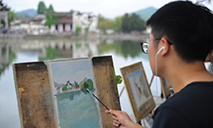Xinjiang Speaks: Young generations keep ethnic cultural heritage alive
URUMQI, Dec. 14 (Xinhua) -- Lu Bingjian runs a cultural and creative production company in northwest China's Xinjiang Uygur Autonomous Region. The silver sand from the Taklimakan Desert stored in his courtyard is an important material for the best-selling products of his company.
Lu's company launched a blind box in September -- a pottery vessel filled with sand, an empty hourglass and some cotton seeds.
"The Uygur pottery craft is one of the intangible cultural heritage projects in Xinjiang. Customers can find some articles that we bury in the potteries, which are duplicates of well-known cultural relics unearthed in Xinjiang. The sand can be recycled for the sand clock, while the cotton seeds can be planted in the potteries symbolizing a bright future," Lu said.
Xinjiang is the largest high-quality cotton production base in China and an important producer of the crop in the world.
Creative products related to intangible cultural heritage and traditional culture like the blind box have won over young consumers. The company received positive feedback from its customers who praised the mysterious product, according to Lu.
Lu's team consists of young local illustrators, designers and copywriters in Xinjiang.
"The young people have their own unique understanding and feelings for local cultures of various ethnic groups, which will become an important supporting force for the region's cultural and creative industry in the future," he said.
Iiham Rayim is an inheritor of the Twelve Muqams, known as the "Mother of Uygur Music," which is a group of classical music pieces combining Uygur singing, dancing and music, considered a treasure of Chinese ethnic music.
The unique art had almost become lost before the founding of the People's Republic of China in 1949. Thanks to the unremitting efforts of the government, as well as local folk artists, the art lives on today.
In 2005, Xinjiang Uygur Muqam Arts of China was approved by UNESCO as a "Masterpiece of the Oral and Intangible Heritage of Humanity."
"I witnessed the rescue, protection and inheritance of the Xinjiang Uygur Muqam arts. To better protect and inherit the arts, the government has held diverse activities, which helped more young people learn the unique charm of the arts, and also helped our folk artists increase their incomes in the meantime," the 57-year-old inheritor said.
"I started to learn to play the tanbur (a stringed instrument) in 1991 and was selected as a county-level inheritor in a contest in 2005. I started to enjoy a monthly subsidy of 800 yuan (about 126 U.S. dollars) in 2008," said Molakadir Yaya, a 40-year-old Muqam artist in Shache County in southern Xinjiang.
Shache County is known as the hometown of the Twelve Muqams, with one national-level inheritor, one regional-level inheritor and 23 county-level counterparts.
With concerted efforts, the county has built a center to help protect and promote Muqam arts and facilitate research, exchanges and performances.
Apart from Uygurs, the Uygur Muqam arts have attracted young people of other ethnic groups.
Wang Jiangjiang, an ethnic Han, studied opera performance and composition in Milan, Italy, before he traveled to Xinjiang in 2010. On his journey, Wang learned of the Uygur Muqam arts, immediately taking a liking to it.
Wang devoted himself to traveling across the region to record the arts for more than a decade. He has interviewed performers and recorded performances of more than 3,000 inheritors of Xinjiang Uygur Muqam arts, including Iiham Rayim.
"The Xinjiang Uygur Muqam arts include songs, dances, and folk and classical music. It's very difficult for a person to memorize all of them, and that's why I record them," Wang said.
The Chinese government has attached great importance to documenting and protecting the fine traditional ethnic cultures, ensuring that they are passed on to succeeding generations. All ethnic groups in Xinjiang have items on the national and autonomous regional representative lists of intangible cultural heritage.
"I don't worry about the Muqam arts perishing at all. I mastered the arts by following my teacher, and now I have several apprentices too. In the future, they will be teachers themselves with their own apprentices. We believe that the Muqam arts will be passed on through the generations," Molakadir Yaya said.
Photos
Related Stories
- Border port in Xinjiang handles over 6,000 China-Europe freight trains in 2021
- Xinjiang, My home: Kids make sugarcoated fruits on sticks
- China's Xinjiang sees steady growth in market entities
- Agricultural industrial park helps villagers increase incomes in Xinjiang
- Xinjiang workers condemn "forced labor" slur
Copyright © 2021 People's Daily Online. All Rights Reserved.










